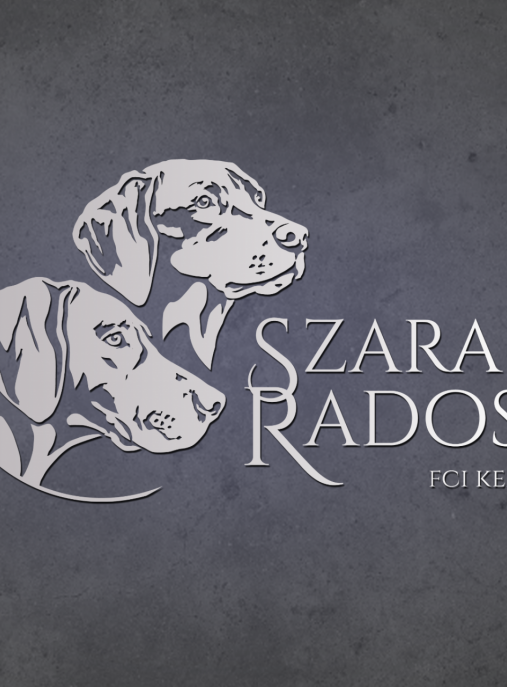The Weimaraner, also known as the "Silver Ghost," is a majestic and versatile dog breed that captures the hearts of many dog enthusiasts. With its sleek silver-gray coat and striking amber or blue-gray eyes, the Weimaraner possesses an elegant and regal appearance. This breed is renowned for its exceptional hunting abilities, intelligence, and loyalty, making it a popular choice for both working and companion purposes.
The history of the Weimaraner breed can be traced back to the early 19th century in Germany. It was developed by the nobility of the Weimar court, hence its name. The Weimaraner was primarily bred for hunting large game, including boars, bears, and deer. The breed's ancestors include various German hunting dogs, such as the Bloodhound, English Pointer, and various scent hounds. These dogs were selectively bred to create a versatile and efficient hunting companion.
According to the FCI (Fédération Cynologique Internationale) typology, the Weimaraner belongs to Group 7: Pointing Dogs. This group includes breeds that are primarily used for hunting and pointing out game. The Weimaraner is classified under Section 1: Continental Pointing Dogs, which includes other renowned hunting breeds like the German Shorthaired Pointer and the German Wirehaired Pointer.
Weimaraners are known for their exceptional hunting skills, but they are also highly adaptable and make wonderful family pets. They thrive in an active household where they can receive plenty of exercise and mental stimulation. Due to their high energy levels, they require regular physical activities such as long walks, jogging, or engaging in dog sports like agility or obedience training.
In terms of size, the Weimaraner is considered a large breed. Males typically stand between 24 to 27 inches (61 to 69 cm) at the shoulder, while females are slightly smaller, ranging from 22 to 25 inches (56 to 64 cm). The average weight for males is around 70 to 90 pounds (32 to 41 kg), while females generally weigh between 55 to 75 pounds (25 to 34 kg).
The life expectancy of a Weimaraner is typically between 10 to 12 years, although some individuals may live longer with proper care and a healthy lifestyle. It's important to note that this breed is prone to certain health issues, including hip dysplasia, bloat, and certain eye conditions. Regular veterinary check-ups, a balanced diet, and appropriate exercise can help mitigate these risks.
One of the most distinctive features of the Weimaraner is its stunning coat. The breed's short and smooth coat is typically a solid silver-gray color, although some may have a slight blue tinge. This unique coat requires minimal grooming, making it relatively low maintenance. However, regular brushing can help keep their coat healthy and shiny.
Weimaraners are known for their unwavering loyalty and affection towards their families. They form strong bonds with their owners and thrive on human companionship. However, they can be reserved and aloof with strangers, making them excellent watchdogs. Early socialization and training are crucial to ensure they develop into well-rounded and confident dogs.
Another interesting fact about the Weimaraner is its intelligence and trainability. These dogs are highly intelligent and eager to please, making them quick learners. They excel in various dog sports and activities, including obedience, tracking, and even search and rescue. Mental stimulation is essential for this breed to prevent boredom and destructive behaviors.
In conclusion, the Weimaraner is a remarkable breed that combines beauty, athleticism, and intelligence. Whether as a hunting companion, a working dog, or a beloved family pet, the Weimaraner brings joy and devotion to its owners. With proper care, training, and socialization, this breed can thrive in various environments and provide a lifetime of love and companionship.
The Weimaraner, often referred to as the "Gray Ghost," is a breed of dog known for its striking appearance and distinctive character. These elegant and athletic dogs possess a unique combination of intelligence, loyalty, and energy, making them a popular choice for active individuals and families. In this text, we will delve into the character of Weimaraner dogs, their behavior, and how to raise and train them effectively.
Weimaraners are highly intelligent dogs with an inquisitive nature. They are quick learners and thrive on mental stimulation. This breed requires regular exercise and mental challenges to prevent boredom and destructive behavior. Due to their high energy levels, Weimaraners are best suited for active households that can provide them with ample opportunities for physical exercise and mental engagement.
One of the defining characteristics of Weimaraners is their unwavering loyalty and devotion to their families. They form strong bonds with their owners and are known to be highly protective. This loyalty can sometimes manifest as separation anxiety if they are left alone for extended periods. It is crucial to gradually acclimate them to being alone and provide them with toys or puzzles to keep them occupied.
Weimaraners are generally friendly and sociable dogs. They tend to get along well with children and other pets if properly socialized from an early age. Early socialization is essential to ensure they develop good manners and appropriate behavior around other animals and people. Exposing them to various environments, sounds, and experiences will help them grow into well-rounded dogs.
Due to their hunting background, Weimaraners have a strong prey drive and an instinct to chase. It is important to keep them on a leash or in a securely fenced area to prevent them from pursuing small animals. Recall training is crucial for off-leash activities, and a solid foundation in obedience training is highly recommended.
Consistency and positive reinforcement are key when training a Weimaraner. They respond well to reward-based training methods, such as treats, praise, and play. Harsh training techniques or punishment can lead to fear or aggression in this sensitive breed. Patience, firmness, and positive reinforcement will yield the best results.
Weimaraners thrive on human companionship and can become anxious or bored if left alone for long periods. They are not well-suited for a sedentary lifestyle or being confined to a small space. Regular exercise, such as long walks, runs, or engaging in dog sports like agility or tracking, is essential to keep them physically and mentally stimulated.
Grooming a Weimaraner is relatively low maintenance. Their short, sleek coat requires occasional brushing to remove loose hair. They are a clean breed and do not have a strong odor. However, their ears should be regularly checked and cleaned to prevent infections.
In conclusion, Weimaraners are intelligent, loyal, and energetic dogs that require an active and dedicated owner. With proper socialization, training, and exercise, they can be excellent companions and family pets. Their striking appearance and unique character make them a breed that stands out in any setting.
The Weimaraner is a majestic and intelligent breed known for its sleek silver-gray coat and striking blue or amber eyes. These dogs are highly energetic, loyal, and make excellent companions for active individuals or families. To ensure the well-being and happiness of your Weimaraner, it is essential to provide them with proper care and attention. Here are some tips on how to care for Weimaraner dogs, including what to do and what not to do:
1. Exercise: Weimaraners are high-energy dogs that require plenty of exercise to stay healthy and happy. Aim for at least one to two hours of vigorous exercise daily, such as running, hiking, or playing fetch. Regular exercise will help prevent behavioral issues that may arise from pent-up energy.
2. Mental Stimulation: Alongside physical exercise, mental stimulation is crucial for Weimaraners. Engage their intelligent minds with puzzle toys, obedience training, or interactive games. This breed thrives when given tasks to complete, so consider activities like scent work or agility training.
3. Socialization: Early and ongoing socialization is vital for Weimaraners. Introduce them to various people, animals, and environments from a young age to prevent shyness or aggression. Enroll them in puppy classes or arrange playdates with other well-behaved dogs to foster positive social skills.
4. Grooming: Weimaraners have short, low-maintenance coats that require minimal grooming. Brush their coat once a week to remove loose hair and keep their skin healthy. Regularly check their ears for signs of infection and trim their nails as needed. Bathing should only be done when necessary to avoid drying out their skin.
5. Training: Weimaraners are intelligent and eager to please, making them highly trainable. Start obedience training early, using positive reinforcement techniques such as treats, praise, and play. Consistency and patience are key, as this breed can be stubborn at times.
6. Mental Health: Weimaraners are prone to separation anxiety, so avoid leaving them alone for extended periods. Provide them with mental stimulation, such as puzzle toys or leaving the TV or radio on, to alleviate boredom. Crate training can also help them feel secure when you're away.
7. Health Care: Regular veterinary check-ups are essential to monitor your Weimaraner's overall health. Vaccinations, flea and tick prevention, and heartworm medication should be administered as recommended by your veterinarian. Be aware of breed-specific health issues such as hip dysplasia, bloat, and certain eye conditions, and discuss preventive measures with your vet.
What NOT to do:
1. Neglect exercise: Lack of exercise can lead to destructive behavior and obesity in Weimaraners. Avoid confining them to a small space or neglecting their exercise needs.
2. Use harsh training methods: Weimaraners respond best to positive reinforcement training techniques. Avoid using punishment or harsh methods, as it can lead to fear or aggression.
3. Leave them alone for long periods: Weimaraners thrive on human companionship and can become anxious or develop destructive behaviors if left alone for extended periods. Ensure they have adequate mental stimulation and company.
4. Overfeed: Weimaraners have a tendency to gain weight, so it's important to feed them a balanced diet and monitor their food intake. Avoid overfeeding or giving excessive treats, as it can lead to obesity and related health issues.
5. Skip socialization: Failing to socialize your Weimaraner can result in behavioral problems such as fear or aggression towards other dogs or people. Make socialization a priority from an early age.
By following these tips, you can provide your Weimaraner with the care they need to thrive. Remember, a well-exercised, mentally stimulated, and properly trained Weimaraner will be a happy and well-behaved companion for years to come.
The Weimaraner dog breed is renowned for its striking and unique coat color, which is commonly referred to as "silver-gray." This color is one of the defining characteristics of the breed and contributes to their overall elegance and regal appearance. The silver-gray coat of a Weimaraner is truly captivating and sets them apart from other breeds.
The silver-gray color of a Weimaraner's coat can vary in shades, ranging from a light, almost platinum-like hue to a deeper, more charcoal gray. This variation adds depth and dimension to their appearance, making them even more visually appealing. The coat has a distinct metallic sheen, which further enhances its beauty and gives it a lustrous quality.
The silver-gray color is evenly distributed throughout the Weimaraner's body, including the head, neck, back, chest, and limbs. The coat is typically short and sleek, accentuating the smoothness and elegance of their physique. This short coat also makes grooming relatively easy, as it requires minimal maintenance compared to longer-haired breeds.
One of the most fascinating aspects of the Weimaraner's coat color is its ability to change with age. When they are born, Weimaraner puppies have a darker coat, often resembling a charcoal gray or even a black color. However, as they grow older, their coat gradually lightens and develops the characteristic silver-gray shade. This color transformation is a remarkable process to witness and adds to the breed's allure.
The silver-gray coat of a Weimaraner is not only visually appealing but also serves a practical purpose. It acts as excellent camouflage in various environments, allowing them to blend seamlessly into their surroundings. This quality was particularly advantageous when the breed was primarily used for hunting, as it enabled them to approach prey undetected.
In addition to their silver-gray coat, Weimaraners often have striking, piercing blue or amber-colored eyes. These eyes are captivating and add to the breed's overall charm. The combination of their silver-gray coat and mesmerizing eyes creates a captivating and unforgettable appearance.
Overall, the silver-gray color of a Weimaraner's coat is a defining characteristic of the breed. It is a visually stunning and unique color that enhances their regal and elegant appearance. Whether they are standing proudly in a show ring or running gracefully through the fields, the silver-gray coat of a Weimaraner is sure to turn heads and leave a lasting impression.
The Weimaraner, with its sleek silver coat and striking blue-gray eyes, is a magnificent breed known for its athleticism, intelligence, and loyalty. While generally a healthy breed, Weimaraners are prone to certain health issues that owners should be aware of to ensure their beloved pets live long and happy lives.
One of the most common health concerns in Weimaraners is hip dysplasia. This hereditary condition occurs when the hip joint doesn't develop properly, leading to pain, lameness, and arthritis. Regular exercise on soft surfaces, maintaining a healthy weight, and providing joint supplements can help manage this condition. Additionally, responsible breeders should screen their breeding dogs for hip dysplasia to reduce the risk of passing it on to future generations.
Another prevalent health issue in Weimaraners is gastric dilatation-volvulus (GDV), commonly known as bloat. This life-threatening condition occurs when the stomach fills with gas and twists, cutting off blood supply to vital organs. Feeding multiple small meals throughout the day, avoiding exercise immediately after meals, and using elevated food bowls can help reduce the risk of bloat. In severe cases, emergency surgery may be required.
Weimaraners are also prone to certain eye conditions, including progressive retinal atrophy (PRA) and entropion. PRA is a degenerative disease that leads to vision loss and eventual blindness. Regular eye examinations by a veterinary ophthalmologist can help detect PRA early, allowing for appropriate management and support. Entropion, on the other hand, is a condition where the eyelid rolls inward, causing irritation and potential corneal damage. Surgical correction is often necessary to alleviate discomfort and prevent complications.
Additionally, Weimaraners may be predisposed to certain skin allergies and autoimmune disorders. Allergies can manifest as itching, redness, and recurrent ear infections. Identifying and avoiding allergens, such as certain foods or environmental triggers, can help manage these allergies. Autoimmune disorders, such as hypothyroidism or immune-mediated hemolytic anemia, require lifelong management with medication and regular veterinary monitoring.
To ensure the overall health and well-being of Weimaraners, regular veterinary check-ups are essential. Vaccinations, parasite prevention, and dental care should be prioritized. A balanced diet tailored to their specific needs, including high-quality protein and appropriate fat levels, is crucial for maintaining optimal body condition and muscle tone. Regular exercise is also vital to prevent obesity and keep their active minds stimulated.
Mental stimulation is equally important for Weimaraners, as they are intelligent and energetic dogs. Engaging them in activities like obedience training, puzzle toys, and interactive playtime can help prevent boredom and destructive behaviors.
Lastly, responsible breeding practices play a significant role in maintaining the health of Weimaraners. Reputable breeders should conduct health screenings on their breeding dogs, including hip and eye evaluations, to minimize the risk of passing on genetic disorders.
In conclusion, while Weimaraners are generally healthy dogs, they are prone to certain health issues that owners should be aware of. Regular veterinary care, a balanced diet, exercise, mental stimulation, and responsible breeding practices are essential for ensuring the overall health and longevity of these magnificent dogs. With proper care and attention, Weimaraners can live happy, active lives as cherished members of their families.
The Weimaraner is a magnificent breed known for its sleek silver-gray coat and striking blue or amber eyes. These dogs are highly energetic, intelligent, and require a well-balanced diet to support their active lifestyle. Proper nutrition is essential for maintaining their overall health, muscle development, and longevity. In this text, we will delve into the nutrition requirements of Weimaraner dogs, offering advice on what and how to feed them, as well as highlighting foods to avoid.
Weimaraners are medium to large-sized dogs with a high metabolism, which means they need a diet rich in high-quality proteins, healthy fats, and complex carbohydrates. Protein is crucial for muscle development and repair, so it should make up a significant portion of their diet. Look for dog foods that contain real meat as the primary ingredient, such as chicken, turkey, or fish. Avoid foods that list meat by-products or fillers as the main ingredient, as these are of lower quality and provide less nutritional value.
Fats are another essential component of a Weimaraner's diet. They provide a concentrated source of energy and support healthy skin and coat. Look for dog foods that contain healthy fats like fish oil, flaxseed oil, or chicken fat. These fats also contain omega-3 and omega-6 fatty acids, which have anti-inflammatory properties and promote overall well-being.
Complex carbohydrates are necessary to provide sustained energy for active Weimaraners. Look for dog foods that include whole grains like brown rice, oatmeal, or quinoa. These grains are a good source of fiber, which aids in digestion and helps maintain a healthy weight. Avoid dog foods that contain excessive amounts of corn, wheat, or soy, as these can cause allergies or digestive issues in some dogs.
It's important to note that Weimaraners have a tendency to develop food allergies or sensitivities. If you notice any signs of allergies, such as itching, gastrointestinal upset, or skin irritations, consult with your veterinarian to determine the cause and make necessary dietary adjustments. In some cases, a limited ingredient diet or a grain-free diet may be recommended.
Feeding guidelines for Weimaraners vary depending on their age, weight, and activity level. Puppies require more frequent meals to support their rapid growth, while adult dogs can be fed twice a day. It's important to measure the food portions according to the manufacturer's recommendations and adjust as needed to maintain a healthy weight. Overfeeding can lead to obesity, which can put strain on their joints and overall health.
In addition to a balanced diet, fresh water should always be available for your Weimaraner. Hydration is crucial, especially during periods of exercise or hot weather. Treats can be given in moderation, but it's important to choose healthy options that complement their diet. Look for treats that are low in calories and made with natural ingredients.
While it's tempting to share human food with your Weimaraner, there are certain foods that should be strictly avoided. These include chocolate, grapes, raisins, onions, garlic, caffeine, alcohol, and anything containing xylitol, as they can be toxic to dogs and cause serious health issues.
In conclusion, a well-balanced diet is essential for the overall health and well-being of Weimaraner dogs. Providing them with high-quality proteins, healthy fats, and complex carbohydrates will support their active lifestyle and maintain their optimal health. Remember to consult with your veterinarian for personalized advice and to monitor your dog's weight and overall condition regularly.








































